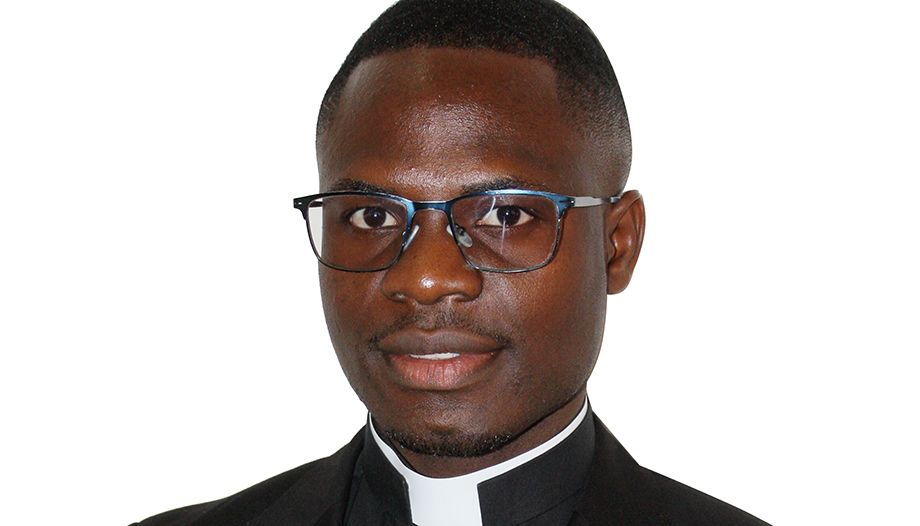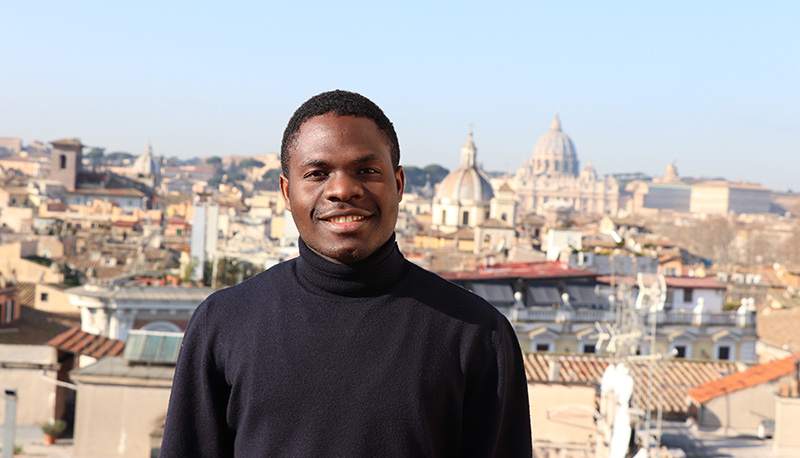
Francisco Eusebio Vinumo, an Angolan in Rome, sees the eternal city as an unimaginable dream. For him it is like this: "It is a city with a centuries-old Christian history. To be here is to touch the roots of our ancestors, our patriarchs in Christianity.You get to live and socialize with saints, martyrs, popes, and all those who have left their mark on the history of Christianity. Being here is an incomparable experience, because you marvel at everything you see; you touch things handed down by the apostles and the saints.... In short, to be in Rome is to experience the universality of the Church".
But until he arrived in Rome, Francis Eusebius went through various trials and choices. He grew up happily in a large family. He was the youngest of six siblings in a family well protected and cared for by his mother, Maria Teresa of Jesus, who instilled in her children the love of the Lord.

His life passed normally. And so he explains that his vocation had nothing extraordinary about it, "like the biblical vocations of Moses, Abraham, Isaiah, Jeremiah, Samuel and those of some priests and nuns, which had a kind of magic touch". Perhaps, however, that 'magic touch' Francis speaks of was given to him by his beloved mother in the course of an ordinary, everyday life.
Maria Teresa, as an African mother who welcomes, educates and cares, encouraged her six children (three boys and three girls, and a seventh in heaven) to participate in religious activities, such as catechesis and the rosary that they sometimes prayed as a family and, most importantly, attendance at Holy Mass.
As a disciplined and traditionalist family in Africa, they received some punishments, if they did not participate in religious activities, something that is not recommended, but that Francis remembers without trauma, as something "funny in the Christian life of our family, funny because it was unusual, but that was very significant for our religious formation".
Therefore, going to Mass and catechesis was an obligation for the children and, if they did not participate, they were punished without a meal and washing all the dishes. And as his story will surely miss, Francisco qualifies with a smile: "A mother's love is so great that, to those punished, in the end she always kept some food for us, even if it was not a full meal".
Francis insists that these types of punishments, however inadvisable they may seem, both he and his brothers remember them with nostalgia and gratitude, because, just as God corrects his children with love, this punishment was pedagogical, because our mother always wanted our good and wanted to see us on the right path.. And thanks to these punishments my vocational adventure began.
Between the pedagogical punishment and attending Mass, one interest awakened in him: to observe the priest attentively. "His way of celebrating captivated me, especially when he sang. In the immensity and diversity with which God calls people into his vineyard, I felt called to serve him in those moments.".
Another figure no less important in the discovery of his vocation was his brother, who by then was already a seminarian and now a priest. His testimony greatly influenced his choice.
So she began attending the vocation group of her parish, led by the Sisters of the Most Holy Savior, and then joined the group of altar servers.
However, the process of entering the seminary was not easy. First of all, the pastor had to make a choice, because the number of altar boys and vocations is greater than the number of vacancies. Fortunately, he was one of those chosen. But the battle was not over yet, as he had to go through another admission test at the minor seminary. Once again, the number of applicants was enormous. As they say: "when God calls you, insist until you get it".
After the test, a few days later, he discovered with enthusiasm that he was one of those admitted. So, at the age of 14, in 2011, I entered Our Lady of Mercy minor seminary, in the archdiocese of Huambo.
As in every journey, there have been difficulties and challenges in his seminary career, but today he feels more and more mature in his priestly vocation.
"In the seminaries where I have been, both in Angola and here in Rome, at the Sedes Sapientiae seminary, everything has come together so that my faith, my love for God, for the Virgin Mary and my perseverance in my vocation have grown and become stronger and stronger," he expresses with enthusiasm.
And from Africa to Rome, which, as he said at the beginning, his stay in the city of the Tiber is causing him such amazement that he has no words to describe it. Or maybe he does: a "unique, singular, unrepeatable and enriching" experience.
Because for him, coming into contact with a reality different from the one he was used to is always enriching, especially when it is a new culture and a new way of life. modus vivendi totally different.
"I am living this exciting reality because being in Rome, the capital of Christianity, is a unique occasion and opportunity. Not only do you come into contact with a new culture, but with a variety of cultures, meeting people from all over the world. This is experienced in the living together in the seminary and at the university, but also in the environment of the city of Rome and of Italy, where we interact with the world," he says. young Angolan.
Among the variety of people from different countries and cultures, for Francis there is one thing that unites them: Christianity, and especially Catholicism.
"This experience makes you really see and live the nature of the 'One, Holy, Catholic and Apostolic' phrase of the Church, and thus be united in diversity. Living in Rome is a continuous learning, a unique and unrepeatable richness, and I am savoring it. I really see the beauty of the Church in its universality. I dare to say that Rome is the eternal city, not because it never dies, but because it eternalizes you".
And for this wonderful experience that he is living in his beloved Rome, in the Sedes Sapientiae International Seminar and in the Pontifical University of the Holy Crosswould like to conclude with a sincere and heartfelt thank you:
"Today, as a deacon, all I have to say is: thank you, thank you! gratias tibi Dominiand thanks to the benefactors of the CARF Foundation for giving me the immense opportunity to be formed as a seminarian and priest in the Eternal City of Rome!".
Gerardo Ferrara
BA in History and Political Science, specializing in the Middle East.
Head of the student body at the Pontifical University of the Holy Cross in Rome.